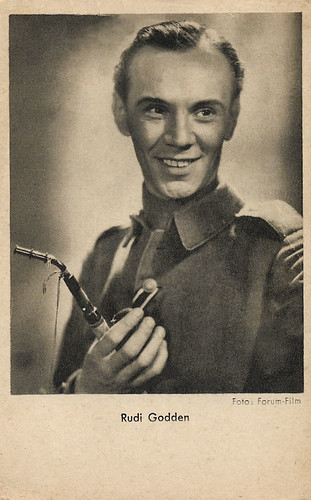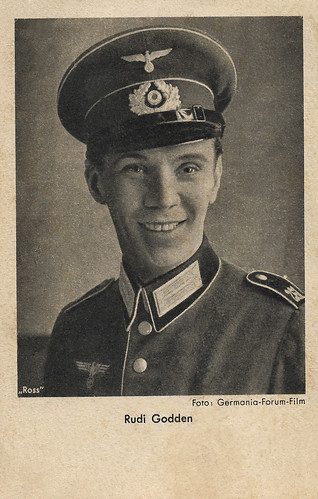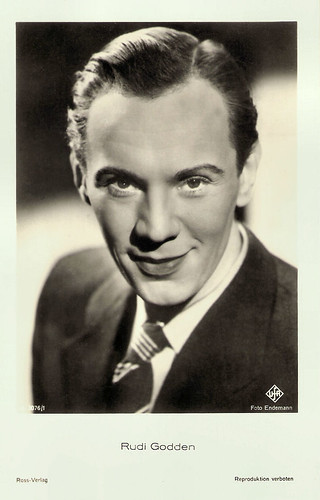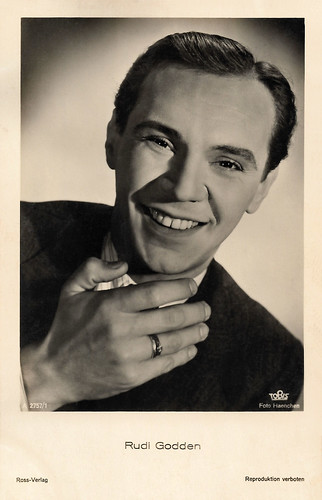
German postcard by Ross Verlag, no. A 1308/1, 1937-1938. Photo: K.J. Fritzsche Productions / Tobis Magna.

German postcard by Ross Verlag, no. A 2004/1, 1939-1940. Photo: Haenchen / Tobis.

German postcard by Ross Verlag, no. A 3022/1, 1941-1944. Photo: Binz, Berlin.
Blue boys
Rudi Godden was born Rudi Lißbauer in Berlin-Moabit in 1907. He was the son of an Austrian café owner and after the early death of his father, his mother married a Berlin cinema owner, Goddeng, in 1910.
In addition to attending school in Berlin, Rostock, and Hamburg, Godden, who initially wanted to become an opera singer, took singing lessons at the Hamburg Opera School but did not continue.
He started a commercial apprenticeship, which he also broke off. He then became an extra at the Kammerspiele and the Deutsches Schauspielhaus.
From the end of the 1920s, he went on tour in Holland and Germany with the singing quartet 'Blue Boys', which he co-founded. From 1930 he collaborated with Ernst Brenn, with whom he initially performed as a duo in Germany and abroad.
Since 1935 he was a member of the cabaret 'Die acht Entfesselten' (The Eight Unleashed), which is endorsed by the Nazis as non-political entertainment. Godden performs together with Gerti von Reichenhall, whom he marries in 1937. In 1939 the 'Entfesselten' are disbanded.

German card by Das Programm von Heute, Berlin. Photo: Forum-Film. Rudi Godden in Musketier Meier III/Musketeer Meier III (Joe Stöckel, 1938).

German card by Ross Verlag. Photo: Germania / Forum-Film. Rudi Godden in Das Gewehr über/Shoulder Arms (Jürgen von Alten, 1939).

German card. Photo: Tobis.
The charming, always good-humoured boy next door
In 1936 Rudi Godden accepted a contract with Tobis. His film debut was as the cheerful stage manager Peters in the variety film Truxa (Hans H. Zerlett, 1937) with La Jana.
Major roles followed from 1937 to 1940, including one of the title roles (Robert) in the anti-Semitic musical comedy Robert und Bertram (Hans H. Zerlett, 1939) with Kurt Seifert as Bertram. In the revue film Hallo Janine/Hello Janine! (Carl Boese, 1939), he sang the hit song 'Musik, Musik, Musik' ("I don't need millions, I don't lack a penny for happiness...") with Marika Rökk and Johannes Heesters.
In his films, Godden played the charming, always good-humoured boy next door. An exception was the film Das Leben kann so schön sein/Life Can Be So Beautiful (Rolf Hansen, 1938), in which he took on a serious role for the first time. The film was banned and was only released after the war.
He also appeared in the propaganda film Das Gewehr Űber/Shoulder Arms (Jürgen von Alten, 1939). Besides his film work, he appeared in operetta productions at the Admiralspalast and the Metropol, among others, he played the male lead in Schmidseder's 'Frauen im Metropol'.
Rudi Godden died unexpectedly in 1941 at the age of only 33, as a result of the aftereffects of blood poisoning. His grave in the Old Twelve Apostles Churchyard in Berlin-Schöneberg has been preserved. He was married to the cabaret artist Gerti Godden from 1937.

German postcard by Ross Verlag, no. A 1076/1, 1938-1939. Photo: Endemann / Ufa.

German postcard by Ross Verlag, no. A 2757/1, 1939-1940. Photo: Haenchen / Tobis.

German postcard by Ross Verlag, no. A 2840/1, 1939-1940. Photo: Haenchen / Tobis.
Sources: Filmportal.de (German), Wikipedia (German and English), and IMDb.
This post was last updated on 4 June 2024.
No comments:
Post a Comment